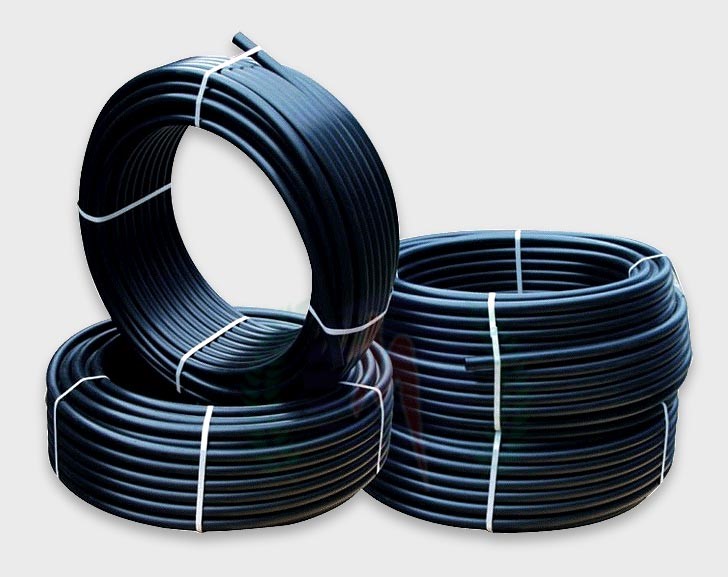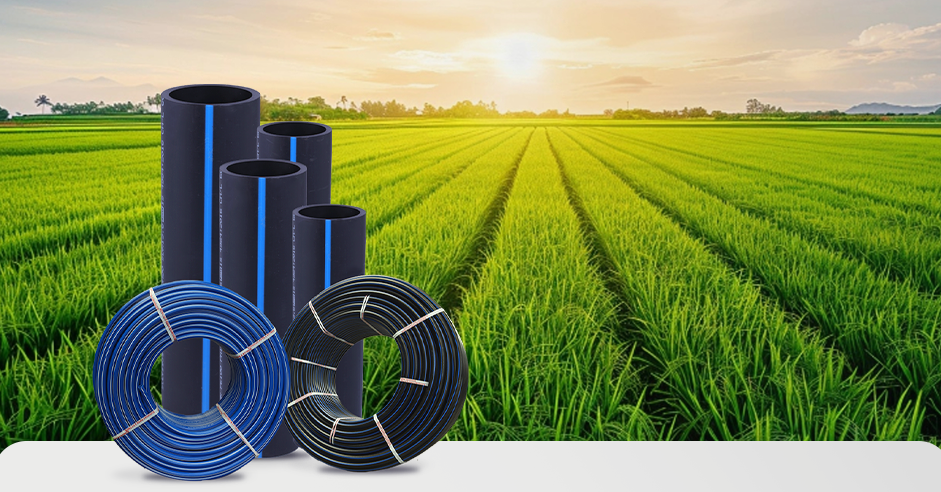A Comprehensive Overview to the Different Uses HDPE Pipeline in Construction and Sector
HDPE pipes have actually emerged as an essential element in modern-day construction and commercial applications. Their unique residential or commercial properties, such as resistance to rust and light-weight style, make them ideal for a vast variety of usages. From water supply systems to farming irrigation, HDPE pipes offer options that improve efficiency and sustainability. Understanding their diverse applications is vital for specialists seeking to optimize infrastructure. What specific benefits do these pipes give each field?
Water and Circulation Systems
Supply of water and circulation systems are vital components of city facilities, typically counting on high-density polyethylene (HDPE) pipelines for their resilience and effectiveness. These systems transport drinkable water from treatment facilities to consumers, guaranteeing access and safety and security. HDPE pipes are preferred for their resistance to corrosion, chemicals, and extreme temperature levels, which boosts their longevity and reduces upkeep prices. Furthermore, their lightweight nature permits less complicated installation and transport, making them ideal for different city and rural applications.
The adaptability of HDPE pipes allows them to be mounted in limited rooms and around barriers, minimizing the requirement for extensive excavation (Texas hdpe pipe manufacturer). Their smooth interior surface area minimizes friction losses, boosting water flow prices. As cities continue to expand, the demand for trustworthy water supply systems boosts, placing HDPE pipelines as a sustainable remedy for modern-day facilities tasks. Their tested performance history makes them a recommended choice amongst engineers and metropolitan planners alike
Wastewater Management and Treatment
Effective wastewater management and therapy are vital for maintaining public health and wellness and ecological high quality. HDPE pipes play a crucial role in this procedure due to their toughness, resistance to corrosion, and capacity to hold up against rough chemicals. These pipes are generally used in different applications, consisting of sewer system, stormwater water drainage, and wastewater therapy centers. Their lightweight nature helps with simpler setup and transportation, lowering labor costs and time.
On top of that, HDPE pipes have a smooth indoor surface that reduces friction loss, advertising effective flow prices. They are likewise less prone to leakages and failings contrasted to conventional products, ensuring that pollutants are contained efficiently. Their adaptability enables for flexibility in various soil problems, making them appropriate for varied environmental setups. As markets increasingly focus on sustainable methods, making use of HDPE pipelines in wastewater management systems lines up with objectives for decreasing environmental influence and enhancing resource recovery.
Agricultural Irrigation Solutions
In farming settings, reliable irrigation solutions are essential for maximizing crop yields and taking care of water sources. HDPE (High-Density Polyethylene) pipes play an essential role in contemporary irrigation systems as a result of their sturdiness, adaptability, and resistance to corrosion. Their capacity to stand up to high pressures makes them optimal for both surface area and subsurface irrigation applications, ensuring uniform water circulation throughout areas.
Farmers can make use of HDPE pipelines in drip irrigation systems, which supply water straight to plant roots, decreasing waste and advertising healthy growth. Additionally, these pipes are light-weight and easy to set up, reducing labor costs and installation time. Their lengthy lifespan and low upkeep demands further boost their allure in farming techniques.
HDPE pipes are environmentally pleasant, as they can be reused and do not leach unsafe chemicals into the dirt. This makes them a lasting option for farmers aiming to adopt inch to 2 inch reducer environmentally friendly agricultural methods while making best use of efficiency.
Industrial Applications and Procedures
Versatility is a hallmark of HDPE pipelines, making them vital in various commercial applications and procedures. These pipes are extensively made use of in chemical processing markets due to their excellent resistance to a wide variety of harsh compounds. HDPE's light-weight nature, integrated with high tensile toughness, enables very easy installation and lasting performance popular settings.
In the oil and gas industry, HDPE pipelines play an essential duty in transferring hydrocarbons and gases, thanks to their resilience and flexibility - Midland TX HDPE Pipe Fittings in Stock. Additionally, they are utilized in mining operations for the transportation of slurry and other products, where traditional piping systems may fail
Additionally, HDPE pipelines are increasingly made use of in producing centers for water supply lines read the full info here and wastewater monitoring. Their capability to stand up to severe temperatures and pressures makes them ideal for a variety of commercial processes. On the whole, HDPE pipes add considerably to effectiveness and safety and security across diverse commercial applications.
Stormwater Administration and Water Drainage Equipments
Stormwater management and water drainage systems are important parts in city framework, created to handle excess rains and lower flooding threats. High-density polyethylene (HDPE) pipes are progressively made use of in these systems due to their toughness, adaptability, and resistance to corrosion. These pipes effectively transport stormwater away from inhabited areas, lessening surface area drainage and avoiding waterlogging.
HDPE's lightweight nature assists in easier setup, minimizing labor expenses and building time. Additionally, its resistance to chemicals and ecological stress factors guarantees longevity and dependability in different environments. Along with conventional water drainage applications, HDPE pipes are additionally employed in innovative solutions such as eco-friendly facilities, which includes rain yards and absorptive pavements.

Regularly Asked Questions
Just How Does HDPE Pipeline Contrast to PVC Pipe in Price?
As a whole, HDPE pipe often tends to be a lot more pricey than PVC pipe as a result of its improved durability and adaptability. Nevertheless, long-lasting expense factors to consider, such as maintenance and life expectancy, may prefer HDPE in certain applications.

What Is the Life-span of HDPE Piping Under Diverse Problems?
HDPE pipes normally have a life expectancy of 50 to 100 years, relying on environmental conditions, setup techniques, and use. Variables such as temperature level, dirt kind, and direct exposure to chemicals can substantially affect their longevity.
Can HDPE Pipeline Be Recycled After Usage?
Yes, HDPE pipes can be recycled after usage. The reusing procedure entails thawing down the product, enabling it to be repurposed right into new items, therefore promoting sustainability and lowering ecological influence associated with plastic waste.
Are There Any Kind Of Specific Installation Obstacles With HDPE Pipes?
Installment obstacles with HDPE pipes include appropriate jointing techniques, making certain sufficient trench problems, and handling thermal development. In addition, competent labor is needed to handle specific devices, which can make complex the setup procedure in different settings.

What Qualifications Should I Try To Find When Acquiring HDPE Pipes?
When purchasing HDPE pipes, one should try to find accreditations such as ASTM, AASHTO, and ISO, which validate top quality and conformity with market requirements, assuring sturdiness and performance in different applications. - Pipe Manufacturing Midland TX